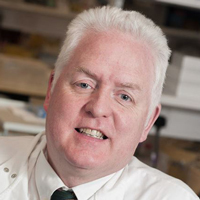
Professor Mark Lawler PhD, FRCPath
Chair in Translational Cancer Genomics, Queens University Belfast
Nowhere has the success of personalised medicine been more evident than in the treatment of chronic myeloid leukaemia (CML). Furthermore, Irish patients have benefited greatly.
In December 2015, during the Luxembourg European Union (EU) Presidency, the Council of the EU issued its Conclusions on Personalised Medicine for Patients, highlighting how “the development of personalised medicine may offer new opportunities for the treatment of patients in the European Union […] allowing healthcare providers to offer better-targeted treatment, avoid medical errors and reduce adverse reactions to medicinal products.”
Nowhere has the success of personalised medicine been more evident than in the treatment of chronic myeloid leukaemia (CML). Irish patients have benefited greatly from the breakthroughs in the treatment of this disease. If I were writing this article in the 1980s, there would be very little to say. CML was essentially a death sentence, with ineffective treatments and little hope for patients. But our understanding of what is happening at the gene level inside the CML cell has led to a more personalised approach to treatment. This has given significant hope to patients and greatly extended their life expectancy.
Understanding the molecular ‘switch’ that makes CML cells resistant to standard treatments has led to the development of targeted therapies. These therapies use a type of medicine known as a tyrosine kinase inhibitor (TKI).
Since TKIs became available in 2001, the treatment landscape has been revolutionised. TKIs are now the standard of care for CML.
TKIs have been a game changer for personalised medicine
I have been fortunate to work closely with one of the people who developed this new therapy. Professor Charles Sawyers from Memorial Sloan Kettering Cancer Centre in New York described by the prestigious Journal of Clinical Investigation as “the greatest cancer researcher of our time.”
Charles told me how it still gives him goose bumps when he remembers his fax machine whirring as the critical laboratory results came in to show that the treatment seemed to have worked. The patient, who was from Santa Barbara, is alive and well some 25 years after that first clinical trial.
Ireland – and more importantly Irish patients – played a key role in the further development of TKIs. Doing so by participating in some of the early clinical trials on an all-Ireland basis through the Haematology Association of Ireland.
Quality of patient pathways is increasingly important
So, TKIs have truly been a game changer in the treatment of CML, but important challenges remain. The cancer cell is clever and can develop resistance to treatment. So we need to be clever, too, and outwit the cancer cell through the development of innovative approaches. Science and its application must inform medicine.
We also need to consider the quality of life of patients. We must support people to live beyond their cancer and return to normal living. Our research at a European level has shown that cancer patients increasingly value their quality of life. This must be included as part of the joint dialogue between the doctor/patient when treatment decisions are (jointly) being made. We also need to support those who care for their loved ones as they go through the difficult cancer journey. And we need to consider cost. Innovation comes at a price and we must ensure that we deliver value-based care for our patients.
Footnote: Recognising his pioneering contribution to personalised medicine and the treatment of CML, Queen’s University Belfast awarded Professor Charles Sawyers an honorary degree in the summer of 2018

